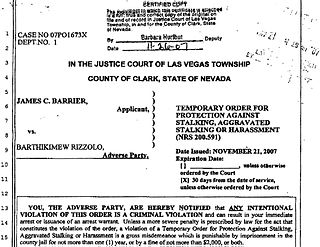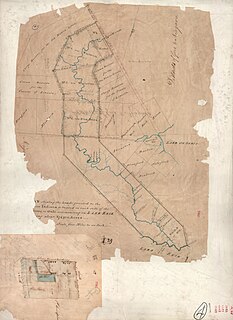Related Research Articles

An injunction is a legal and equitable remedy in the form of a special court order that compels a party to do or refrain from specific acts. "When a court employs the extraordinary remedy of injunction, it directs the conduct of a party, and does so with the backing of its full coercive powers." A party that fails to comply with an injunction faces criminal or civil penalties, including possible monetary sanctions and even imprisonment. They can also be charged with contempt of court. Counterinjunctions are injunctions that stop or reverse the enforcement of another injunction.
A court order is an official proclamation by a judge that defines the legal relationships between the parties to a hearing, a trial, an appeal or other court proceedings. Such ruling requires or authorizes the carrying out of certain steps by one or more parties to a case. A court order must be signed by a judge; some jurisdictions may also require it to be notarized.
The White Patriot Party (WPP) was an American anti-Semitic, anti-Zionist, homophobic, white supremacist paramilitary political party associated with Christian Identity and the Ku Klux Klan. It was led by its founder, Frazier Glenn Miller Jr., through various organizational incarnations. The organization began in the mid-1970s as the Carolina Knights of the Ku Klux Klan. It was involved in the 1979 Greensboro massacre, when a confrontation between Klansmen, Nazis and communists left five people dead. The organization became the Confederate Knights of the Ku Klux Klan in the early 1980s and the White Patriot Party in 1985.

A restraining order or protective order, abbreviated PFA, is an order used by a court to protect a person, object, business, company, state, country, establishment, or entity, and the general public, in a situation involving alleged domestic violence, child abuse, assault, harassment, stalking, or sexual assault. In the United States, every state has some form of domestic violence restraining order law, and many states also have specific restraining order laws for stalking and sexual assault.

Specific performance is an equitable remedy in the law of contract, whereby a court issues an order requiring a party to perform a specific act, such as to complete performance of the contract. It is typically available in the sale of land law, but otherwise is not generally available if damages are an appropriate alternative. Specific performance is almost never available for contracts of personal service, although performance may also be ensured through the threat of proceedings for contempt of court.
A legal remedy, also referred to as judicial relief or a judicial remedy, is the means with which a court of law, usually in the exercise of civil law jurisdiction, enforces a right, imposes a penalty, or makes another court order to impose its will in order to compensate for the harm of a wrongful act inflicted upon an individual.
A civil gang injunction or CGI is a type of restraining order issued by courts in the United States prohibiting gang members in particular cities from participating in certain specified activities. It is based on the legal theory that gang activity constitutes a public nuisance that can prevent non–gang members of the community from enjoying peace and public order. An injunction is obtained against the gang itself, after which the police and district attorney may decide against whom they will enforce it upon. Law enforcement use gang injunctions as a tool to label people as gang members and restrict their activities in a defined area (ACLU).

The Grand River land dispute, also known as the Caledonia land dispute, is an ongoing dispute between the Six Nations of the Grand River and the Government of Canada. It is focussed on lands along the length of the Grand River in Ontario known as the Haldimand Tract, an 385,000 hectares tract that was granted to Indigenous allies of the British Crown in 1784 to make up for territorial losses suffered as a result of the American Revolutionary War and the Treaty of Paris (1783). The Six Nations were granted the land in perpetuity and allege that lands were improperly sold, leased or given away by various Canadian governments, leaving only 5 per cent of the original lands under Six Nations control. The Six Nations also allege that monies owed to the Six Nations from leases and loans on much of the tract have not been paid or were redirected into government coffers.
Asset freezing is a form of interim or interlocutory injunction which prevents a defendant to an action from dealing with or dissipating its assets so as to frustrate a potential judgment. It is widely recognised in other common law jurisdictions and such orders can be made to have world-wide effect. It is variously construed as part of a court's inherent jurisdiction to restrain breaches of its process.

The Federal Circuit Court of Australia, formerly known as the Federal Magistrates Court of Australia or the Federal Magistrates Service, was an Australian court with jurisdiction over matters broadly relating to family law and child support, administrative law, admiralty law, bankruptcy, copyright, human rights, industrial law, migration, privacy and trade practices.
An irreparable injury is, in equity, "the type of harm which no monetary compensation can cure or put conditions back the way they were."
The British privacy injunctions controversy began in early 2011, when London-based tabloid newspapers published stories about anonymous celebrities that were intended to flout what are commonly known in English law as super-injunctions, where the claimant could not be named, and carefully omitting details that could not legally be published. In April and May 2011, users of non-UK hosted websites, including the social media website Twitter, began posting material connecting various British celebrities with injunctions relating to a variety of potentially scandalous activities. Details of the alleged activities by those who had taken out the gagging orders were also published in the foreign press, as well as in Scotland, where the injunctions had no legal force.
In English tort law, a super-injunction is a type of injunction that prevents publication of information that is in issue and also prevents the reporting of the fact that the injunction exists at all. The term was coined by a Guardian journalist covering the Trafigura controversy. Due to their very nature media organisations are not able to report who has obtained a super-injunction without being in contempt of court. The term super-injunction has sometimes been used imprecisely in the media to refer to any anonymised privacy injunction preventing publication of private information. Critics of super-injunctions have argued that they stifle free speech, that they are ineffective as they can be breached using the Internet and social media and that the taking out of an injunction can have the unintended consequence of publicising the information more widely, a phenomenon known as the Streisand effect.

Occupy Nashville was a collaboration that began with demonstrations and an occupation located at Legislative Plaza in Nashville, Tennessee. Special legislation attempting to oust the Occupy Nashville demonstration passed the Tennessee House of Representatives and Tennessee Senate in February 2012.
Madsen v. Women's Health Center, Inc., 512 U.S. 753 (1994), is a United States Supreme Court case where Petitioners challenged the constitutionality of an injunction entered by a Florida state court which prohibits antiabortion protesters from demonstrating in certain places and in various ways outside of a health clinic that performs abortions.

Manchester Airport plc v Dutton[1999] EWCA 844 is an English land law case, concerning licences in land. It confirmed the court will attach to licences, even where narrowly drawn to avoid giving away title, a right to occupy provided it meets with the clear commercial purposes of the contract. This means those third parties, in this case protestors, who interfered with such rights must be removed.
Injunctions in English law are a legal remedy of three types. Prohibitory injunctions prevent an individual or group from beginning or continuing actions which threaten or breach the legal rights of another. Mandatory injunctions are rarer and compel a person to carry out a certain act such as make restitution to an injured party. Freezing injunctions relate to funds such as bank accounts and are commonly Mareva Injunctions which are sought mainly in fraud, breach of trust and confiscatory proceedings. Injunctions are most common in cases involving significant matters of nuisance, privacy and libel ; they are relatively common remedies in major employment/agency/distribution, trust and property disputes, especially interim, interlocutory injunctions pending settlement or final hearing, whichever is the earlier where there is a clear and present danger that the matter in dispute between the parties will be wholly frustrated if the injunction is not imposed. A final hearing only may impose a final injunction which may be equivalent to undertakings given in a legally binding settlement document.
A non-molestation order is, in English law, a type of injunction that may be sought by a victim of domestic abuse against their abuser. It is one of two types of injunction available under Part IV of the Family Law Act 1996, the other being an occupation order. A non-molestation order is aimed at stopping harassment from a partner or ex-partner and also applies to any children that a victim of abuse may have. A breach of such an order is considered a criminal offence in English law.
Diesel Brothers is an American reality television series. The series premiered on January 4, 2016, on Discovery Channel. The program follows a group of friends in Utah who repair and customize pickup trucks.
References
- ↑ "Women's Aid - The Survivor's Handbook - Getting an injunction". womensaid.org.uk. Retrieved 11 June 2015.